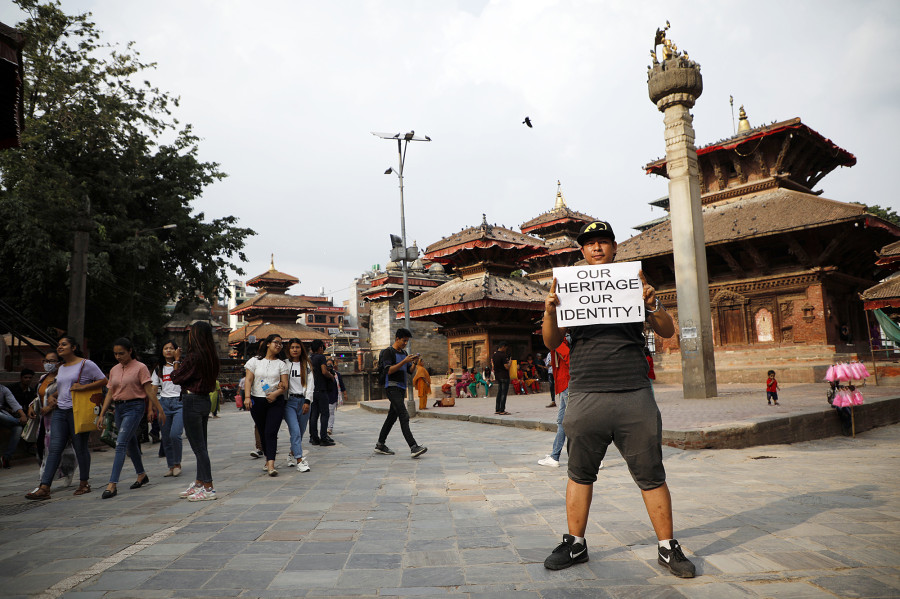Valley
With Guthi Bill, government wants to exploit ancient customs for money, locals say
The controversial bill pits Kathmandu Valley’s indigenous community against a government increasingly bent on extending its control
Arpan Shrestha
Members of Kathmandu Valley’s Newar community say they are ready for a showdown if the government doesn’t drop or revise a controversial bill which envisions nationalising all guthis—trusts—both public and private and regulating all religious sites under a powerful commission.
Following two days of protests and public assemblies, trustees of major guthis on Tuesday held mass meetings at their communities in various parts of Kathmandu Valley, expressing concerns over controversial provisions in the bill, which they said are designed to erase history by wiping out the institutional memory of various indigenous communities.
“It seems that the state has completely ignored or failed to grasp how multifaceted Newar society is, and only focused on economic aspects, like land and building,” said Satya Narayan Dangol of the Nardevi Shwet Kali Ajima Guthi in core Kathmandu.
“This bill is reminiscent of what Mao Tse-tung did in China. It is unacceptable and must be dropped,” Dangol told the Post.
As a part of the Cultural Revolution in the 1960s led by Mao, then chairman of the communist party of China, the Red Guards had launched a destructive campaign against the ‘Four Olds’—old customs, culture, habits and ideas.
Guthis are socio-economic institutions that fund their obligations from incomes off cultivated or leased land as assets. Depending on their obligations, guthis fulfil religious, public service or social roles, and could either involve members from a common lineage, or several.
“By nationalising our guthis, the state intends to suppress our fundamental rights and exploit guthi property for commercial purposes. The bill is a direct attack on all our tangible and intangible heritage and doesn’t say a word about our religion, heritage, culture or tradition,” Dangol said.
That changes coming to these ancient institutions were hinted in November last year, when finance minister Yubaraj Khatiwada stressed the need to develop the Guthi Sansthan—the government body that oversees all guthis in the country—as a ‘modern social corporation’ while safeguarding its historic existence.
“Social capital is the key foundation for prosperity. Guthi Sansthan should contribute to the country’s prosperity,” he had said at the 55th anniversary of the Sansthan, asking office bearers to prepare a master plan.
Khatiwada had expressed readiness on behalf of his ministry to foster the development of the Guthi Sansthan, saying it was unfortunate that the Sansthan had remained idle without generating income in the name of property protection.
Protection and the utilisation of guthi property are just two of the many grave concerns that locals and activists have over the controversial bill. Many guthi trustees see the bill as the final straw in the systematic erosion of indigenous Newar culture and rights by the state.
“Once the guthi property is nationalised, it paves the way for the state to do anything with it, even sell it,” said Prakash Tamrakar, trustee of the Shwet Bhairab Guthi in Basantapur Dabali outside Hanumandhoka. “We are already paying out of our pockets to fund the Rs 7 to 8 lakhs of expenses each year for Indra Jatra.”
The Shwet Bhairab Guthi currently receives cash support from the Guthi Sansthan of just Rs 13,000 for Indra Jatra, Re 1 for Dashain, Rs 8000 for Chaite Dashain, and Rs 500 for daily rituals besides meagre support in kind.
“Before the Guthi Sansthan was set up in 1964, bringing all small and large guthis under its jurisdiction, the produce from our guthi’s land was topped up by donations in kind from devotees, which sustained and preserved our guthi,” Tamrakar said.
According to Tamrakar, the Shwet Bhairab Guthi owns 104 ropanis of land, of which 40 ropanis have been leased out to Dugad Food and Beverage Company in Satungal by the Guthi Sansthan, while 10 ropanis remain illegally occupied by the National Police Academy in Maharajgunj, despite a court order asking it to vacate the premises.
As per sections 23 and 24 of the proposed bill, a new powerful commission would take over all rights and responsibilities of the guthi and all trustee rights would be immediately terminated once the bill is enacted. The provision would also terminate all rights, documents, agreements, even court orders and decisions.
“The new bill snatches community’s rights and hands over everything to a powerful commission. This is no better than what the Guthi Sansthan is already doing; it is actually worse,” said Tamrakar.
The Guthi Sansthan currently oversees 1.45 million ropanis of land across the country and generates revenue by leasing land to individuals or companies. The Sansthan also builds business complexes in guthi property. However, a recent bid to build a business complex by demolishing an old structure in Ason received massive opposition from locals.
There are some 2,335 public guthis under the Guthi Sansthan and according to information officer Saroj Thapaliya, more areas would be mapped across the country and the figures will only rise.
“The criticisms in the media are baseless,” he told the Post over the phone. “The new bill only intends to systematise guthis across the country and regulate them under the provincial set-up of federalism.”
But according to trustees, the bill not only violates the constitutional rights of citizens, as Article 26 (2) of the constitution says every religious denomination shall have the right to operate and protect its religious sites and
religious guthi, while also mocking the spirit of federalism and democracy.
“We elected politicians to power but they have treated us like sheep,” said Nuraj Bajracharya of the Bajrashree Mahavir Guthi. “None of the guthi societies was consulted before preparing this bill, the only intention of which is to displace us natives and our culture.”
As per Section 4 (6) of the bill, private guthis would also be nationalised and regulated under the new Act. This, according to the trustees, shows insensitivity and a lack of understanding of the different kinds of guthis and their functions within the Newar society.
“The intention is to control our religious activities,” said Raghuraj Rajbhandari, whose guthi owns 200 ropanis of land and contributes to some of the Valley’s major traditions, including the Rato Machhindranath Jatra, which concluded on Sunday.
“Private guthis by nature are exclusively for family members who share the same lineage. How can it be nationalised? This sets a dangerous precedent for what might be coming next,” he said.




 20.52°C Kathmandu
20.52°C Kathmandu













